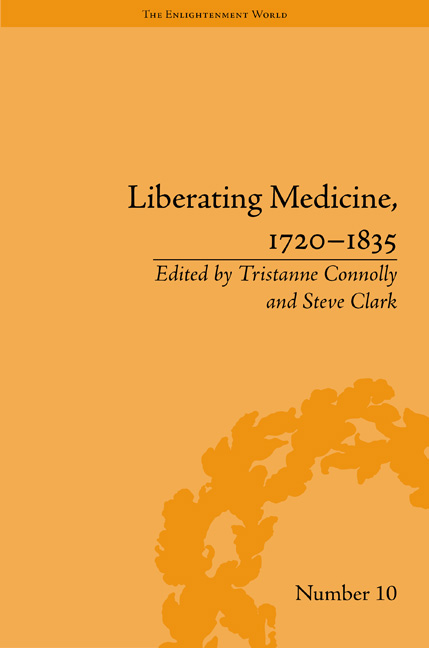Book contents
- Frontmatter
- CONTENTS
- Acknowledgements
- Contributors
- List of Figures
- Introduction
- I Spiritual Sickness and Hypochondria
- II Health and Emancipation
- III Madness
- IV Anatomized and Aestheticized Bodies
- 11 Authority and Imposture: William Godwin and the Animal Magnetists
- 12 George Stubbs's Dissection of the Horse and the Expressiveness of ‘Facsimiles’
- 13 In Submission: Frances Burney's Patient Narrative
- 14 The Surprising Success of Dr Armstrong: Love and Economy in the Eighteenth Century
- V Birth
- Notes
- Works Cited
- Index
13 - In Submission: Frances Burney's Patient Narrative
from IV - Anatomized and Aestheticized Bodies
- Frontmatter
- CONTENTS
- Acknowledgements
- Contributors
- List of Figures
- Introduction
- I Spiritual Sickness and Hypochondria
- II Health and Emancipation
- III Madness
- IV Anatomized and Aestheticized Bodies
- 11 Authority and Imposture: William Godwin and the Animal Magnetists
- 12 George Stubbs's Dissection of the Horse and the Expressiveness of ‘Facsimiles’
- 13 In Submission: Frances Burney's Patient Narrative
- 14 The Surprising Success of Dr Armstrong: Love and Economy in the Eighteenth Century
- V Birth
- Notes
- Works Cited
- Index
Summary
In late September 1811, Frances Burney, Madame D'Arblay, then living in France, underwent a mastectomy of the right breast to remove what was (perhaps falsely) believed to be a cancerous tumour. The twenty-minute procedure, carried out by ‘7 Men in black’ (p. 610), was completed with only a wine cordial as anaesthetic. In addition to a brief, detached and clinical summary of the operation (including pre- and post-op activities and reports) written by a student of the chief surgeon Baron Dominique-Jean Larrey, we have an extensive letter written by Burney to her sister Esther, a letter started about six months after the surgery, in late March 1812, and completed over the course of about four months. The long and heavily edited and revised letter details not just the procedure itself but the weeks leading up to 30 September, from Burney's first complaints about pain in her breast to the initial consultations with different medical professionals to the period of recovery in the weeks following the operation. In ‘Writing the Unspeakable’, the most thorough and sustained treatment of what is usually called ‘The Mastectomy Letter’, Julia Epstein argues that Burney's narrative ‘imaginatively reenacts the anatomization of the author's body, a private body violated and made public through the experience of surgery’. I want to argue here that part of that anatomization includes Burney's description of how she was made to submit to multiple examinations, to the invasive procedure itself, and, ultimately, to the authority of the medical establishment that claimed such submission was necessary ‘for her own good’. Despite Burney's telling us, in the passage that immediately precedes the description of the operation itself, that ‘M. Dubois [“the leading obstetrician of the Empire” (p. 599n)] tried to issue his commands en militaire, but [she] resisted all that were resistible’ (p. 610), in the end, her resistance was for naught. She was, she writes, ‘compelled … to submit’: ‘Hopeless, … desperate, & self-given up, I closed once more my Eyes, relinquishing all watching, all resistance, all interference, & sadly resolute to be wholly resigned’ (p. 612).
- Type
- Chapter
- Information
- Liberating Medicine, 1720–1835 , pp. 181 - 192Publisher: Pickering & ChattoFirst published in: 2014



